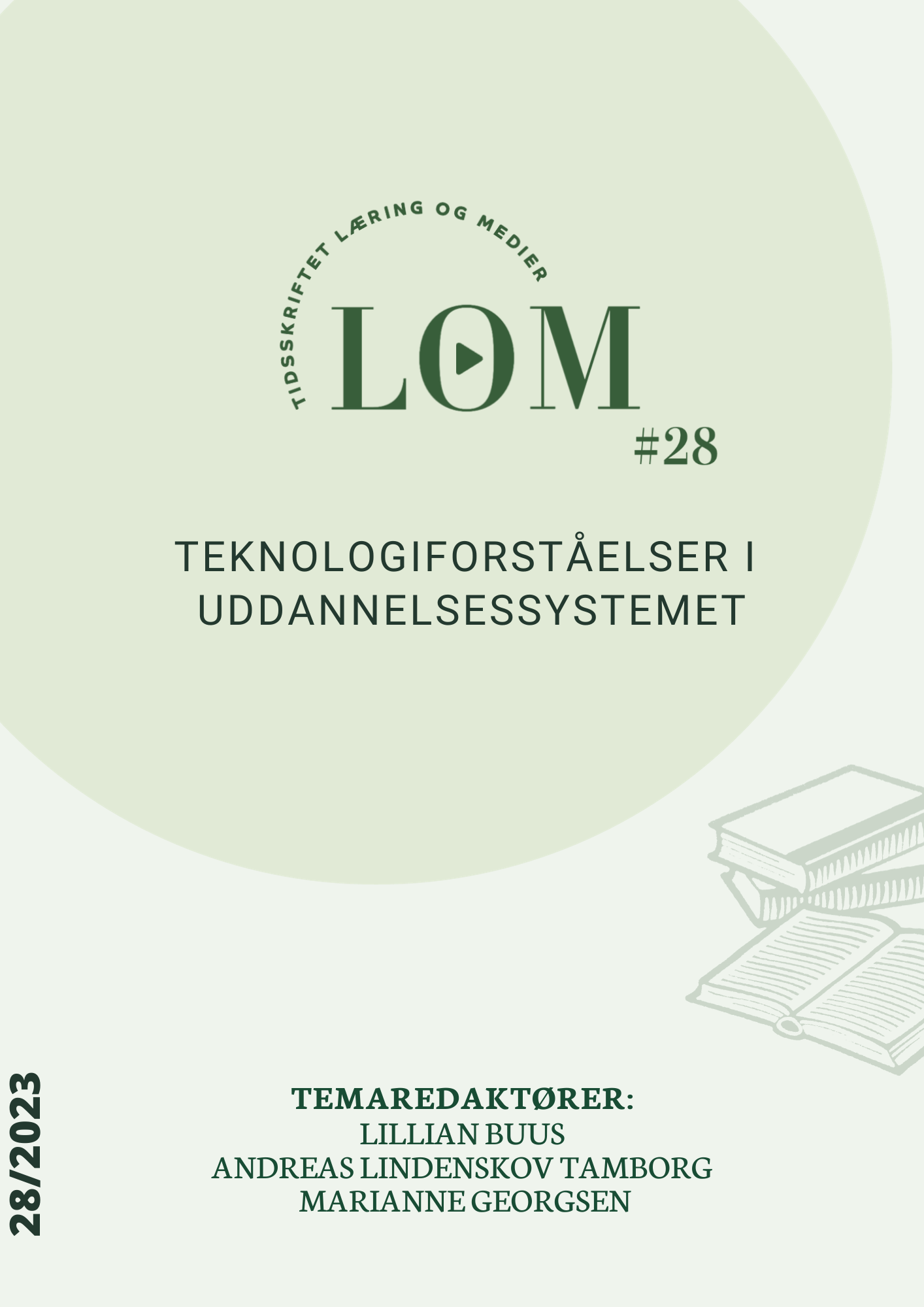Computerspil og faglige fællesskaber
Om computerspil i en centerklasse med læreren som grænsebryder
DOI:
https://doi.org/10.7146/lom.v16i28.136938Nøgleord:
Computerspil, specialundervisning, grænseobjekt, spilkompetence, grounded theoryResumé
Denne artikel bidrager med ny viden om det faglige udbytte ved at inddrage computerspil i undervisningen. Artiklen er baseret på feltforskning i en centerklasse på en større kommunal folkeskole. Undersøgelsen fokuserer på, hvordan en lærer anvender computerspillet World of Warcraft som et grænseobjekt i et tværfagligt forløb i dansk og engelsk, og dermed tilbyder både lærerne og eleverne nogle handlemuligheder, de ellers ikke har. Empirisk er artiklen baseret på data fra to videoobservationer, feltnoter og et interview, der stammer fra besøg i undervisningen på skolen samt forudgående samtaler og e-mailkorrespondance med læreren. Data er behandlet i en grounded theory-inspireret analyse, som viser at dansk- og engelskfaglige læringssituationer er tæt knyttet til brugen af computerspillet. Samtidig ses det, at det faglige potentiale ved brugen af computerspil i undervisningen realiseres, fordi læreren kan skabe en transfer fra spillet som underholdningsmedie til en funktionel sprogundervisning i skolen, der er orienteret efter de faglige mål, som læreren opstiller. Dermed bliver læreren en grænsebryder.
Downloads
Referencer
Beierholm, M. H., Hjorth, M., & Basballe, D. A. (2022). Teknologiforståelse som dannelsesaspekt i Lærerens Grundfaglighed Et møde mellem digitale teknologier og dannelsesteori i undervisningen. Studier i læreruddannelse og -profession, 7(1), 1–29.
Boolsen, M. W. (2010). Grounded Theory. I L. Tanggaard & S. Brinkmann, Kvalitative Metoder. En grundbog (s. 207–239). Hans Reitzels Forlag.
Bundsgaard, J., Christiansen, E. T., Vittrup, B., Noer, J., oksbjerg, M., Billesbølle, S. P., Damkjer, H. F., Brahe-Orlandi, R., Molbæk, M., & Hansen, H. F. (2014). Kommunikationskritisk kompetence. Gyldendal.
Dysthe, O. (2005). Det flerstemmige klasserum: Skrivning og samtale for at lære. Forlaget Klim.
Flyvbjerg, B. (1988). Casestudiet som forskningsmetode. Aalborg Universitetscenter.
Gee, J. P. (2007). What video games have to teach us about learning and literacy (2nd edition). Palgrave Macmillan.
Godsk, H., & Poulsen, L. P. (2010). World of warcraft på skemaet. Viden om læsning, 7, 6.
Hainey, T., Standfield, M., Boyle, L., & Connolly, T. (2011). The Use of Computer Games in Education: A Review of the Literature. Handbook of Research on Improving Learning and Motivation through Educational Games: Multidisciplinary Approaches.
Hanghøj, T. (2009). Playful knowledge. Ph.d.-afhandling, Syddansk Universitet. http://static.sdu.dk/mediafiles/Files/Information_til/Studerende_ved_SDU/Din_uddannelse/phd_hum/afhandlinger/2009/ThorkilHanghoej.pdf
Hanghøj, T. (2013). It og medier som didaktiske grænseobjekter i danskfaget. Cursiv, 12, 103–117.
Hanghøj, T. (2019). Digitale spil i undervisningen: Overblik over et broget landkort. Læring og medier online, 12(21). https://tidsskrift.dk/lom/article/download/112888/162578
Hanghøj, T., & Møller, L. (2017). Den spilkompetente lærer. Learning Tech, 3, 8–31. https://doi.org/10.7146/lt.v2i2.107734
Hanghøj, T., T. Kjellow, Melgaard, S., Møller, L. D., Henningsen, B., & Jensen, E. O. (2021). Sæt skolen i spil: Brug af computerspil og gamification i undervisningen. Aalborg Universitetsforlag.
Hasse, C. (2016). Teknologiforståelse i et kulturperspektiv. Learning Tech, 1(1), 99–114.
Hetmar, V. (2009). Faglig læsning og skrivning i skolen—Diskurser, positioneringer og rekontekstualisering. I S. V. Knudsen, D. Skjelbred, & B. Aamotsbakken (Red.), Lys på Lesing. Lesing av fagtekster i skolen. Novus forlag.
Hollerup, C., Thile, Løvind, S., Granholm, K., & Green, K. (2022). Børns spillevaner 2020 (s. 25). Medierådet Børn og Unge. https://www.medieraadet.dk/medieradet/spil/undersoegelse-boerns-spillevaner-2020
Honglin, C., & Myhill, D. (2016). Children talking about writing: Investigating metalinguistic understanding. I Linguistics and Education (s. 100–108).
Lieberoth, A. (2017). Spilpædagogik. Aarhus Universitetsforlag.
Lieberoth, A. (2019). Hvorfor lokker spilskærmene så meget? Motivation, psykologi og syv spillermotiver. Kvan - et tidsskrift for læreruddannelsen og folkeskolen, 114.
Lieberoth, A., Hanghøj, T., & Misfeldt, M. (2019). Same game, different impact: Diagnosing the successes and failures of one game-based intervention across four schools. Proceedings of the 2018 Connected Learning Summit, 148–157.
Majgaard, G. (2012). Design af computerspil i undervisningen: Fra indfødt spilverdenen til reflekteret designer. Læring og Medier, 5(9), 24.
Mayer, R. (2019). Computer Games in Education. Annual Review of Psychology, Vol. 70, 531–549.
Star, S. L., & Griesemer, J. R. (1989). Institutional Ecology, `Translations’ and Boundary Objects: Amateurs and Professionals in Berkeley’s Museum of Vertebrate Zoology, 1907-39. Sage Journals, Volumen 19(3), 387–420.
Strauss, A., & Corbin, J. (1998). Basics of Qualitative Research—Techniques and Procedures for Developing Grounded Theory (Second edition). Sage Publications Ltd.
Thornberg, R. (2012). Informed Grounded Theory. Scandinavian Journal of Educational Research, Vol. 56(3), 243–259.
Wenger, E. (2004). Praksisfællesskaber—Læring, mening og identitet. Gyldendal Akademisk.
Downloads
Publiceret
Citation/Eksport
Nummer
Sektion
Licens
Copyright (c) 2023 Rasmus Fink Lorentzen, Louise Lottrup

Dette værk er under følgende licens Creative Commons Navngivelse – Ikke-kommerciel – Ingen Bearbejdede Værker (by-nc-nd).

Artikler publiceret i Tidsskriftet for Læring og Medier er licenseret under en Creative Commons Navngivelse-IkkeKommerciel-IngenBearbejdelse 4.0 Unported Licens.
Forfattere bevarer deres ophavsret og giver tidsskriftet ret til første publicering, samtidigt med at værket er omfattet af Creative Commons Attribution-licensen: Navngivelse – Ikke-kommerciel - Ingen Bearbejdede Værker (by-nc-nd). Læs om licensen på http://www.creativecommons.dk/om/.
---
På LOM.dk kan du endvidere finde artikler fra det nu nedlagte Tidsskrift for Universiteternes Efter- og Videreuddannelse (UNEV). Vær opmærksom på, at der gælder særlige regler for UNEV artikler:
Det er forfatterne og evt. andre ophavsret indehavere, der har ophavsretten til artikler udgivet i UNEV regi, og det er en betingelse for adgang til artiklerne, at brugere anerkender og overholder de juridiske retningslinjer forbundet hermed.
- Brugere må downloade og printe én kopi af en hvilken som helst UNEV artikel mhp. private studier eller forskning.
- Det er ikke tilladt at videredistribuere artikler eller anvende disse til indtægtsdækkede aktiviteter eller kommercielle formål.
- Det er tilladt at distribuere URL’en til UNEV artikler.


